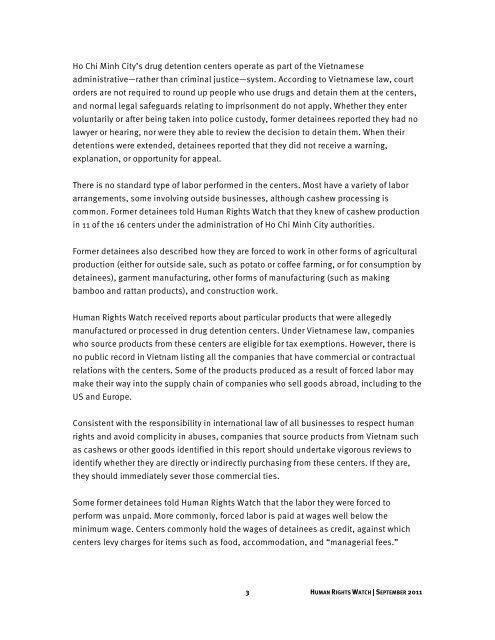The Rehab Archipelago - Human Rights Watch
The Rehab Archipelago - Human Rights Watch
The Rehab Archipelago - Human Rights Watch
Create successful ePaper yourself
Turn your PDF publications into a flip-book with our unique Google optimized e-Paper software.
Ho Chi Minh City’s drug detention centers operate as part of the Vietnamese<br />
administrative—rather than criminal justice—system. According to Vietnamese law, court<br />
orders are not required to round up people who use drugs and detain them at the centers,<br />
and normal legal safeguards relating to imprisonment do not apply. Whether they enter<br />
voluntarily or after being taken into police custody, former detainees reported they had no<br />
lawyer or hearing, nor were they able to review the decision to detain them. When their<br />
detentions were extended, detainees reported that they did not receive a warning,<br />
explanation, or opportunity for appeal.<br />
<strong>The</strong>re is no standard type of labor performed in the centers. Most have a variety of labor<br />
arrangements, some involving outside businesses, although cashew processing is<br />
common. Former detainees told <strong>Human</strong> <strong>Rights</strong> <strong>Watch</strong> that they knew of cashew production<br />
in 11 of the 16 centers under the administration of Ho Chi Minh City authorities.<br />
Former detainees also described how they are forced to work in other forms of agricultural<br />
production (either for outside sale, such as potato or coffee farming, or for consumption by<br />
detainees), garment manufacturing, other forms of manufacturing (such as making<br />
bamboo and rattan products), and construction work.<br />
<strong>Human</strong> <strong>Rights</strong> <strong>Watch</strong> received reports about particular products that were allegedly<br />
manufactured or processed in drug detention centers. Under Vietnamese law, companies<br />
who source products from these centers are eligible for tax exemptions. However, there is<br />
no public record in Vietnam listing all the companies that have commercial or contractual<br />
relations with the centers. Some of the products produced as a result of forced labor may<br />
make their way into the supply chain of companies who sell goods abroad, including to the<br />
US and Europe.<br />
Consistent with the responsibility in international law of all businesses to respect human<br />
rights and avoid complicity in abuses, companies that source products from Vietnam such<br />
as cashews or other goods identified in this report should undertake vigorous reviews to<br />
identify whether they are directly or indirectly purchasing from these centers. If they are,<br />
they should immediately sever those commercial ties.<br />
Some former detainees told <strong>Human</strong> <strong>Rights</strong> <strong>Watch</strong> that the labor they were forced to<br />
perform was unpaid. More commonly, forced labor is paid at wages well below the<br />
minimum wage. Centers commonly hold the wages of detainees as credit, against which<br />
centers levy charges for items such as food, accommodation, and “managerial fees.”<br />
3 HUMAN RIGHTS WATCH | SEPTEMBER 2011

















